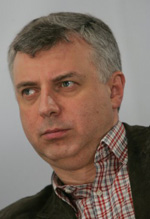Kyiv-Mohyla Academy courses cut in revenge for stand against corruption?
As reported, the Ministry of Education has slashed government funding for a number of Master’s programmes offered by the Kyiv-Mohyla Academy in Kyiv, including those in the School of Journalism and for the social work course. The cuts were announced only after applications for places had closed. The Kyiv-Mohyla Academy staff are convinced that this is revenge for the stand taken by the university leadership against the changes brought in by controversial Minister Dmytro Tabachnyk and against corruption.
In an interview to the information agency UNIAN, President of the National University of “Kyiv-Mohyla Academy” [NaUKMA] Serhiy Kvit stressed that the courses for which funding has been cut – the Mohyla School of Journalism and the Professor Poltavets School of Social Work are unique. He says that social work first appeared at the Kyiv-Mohyla Academy. “Our graduates took part in creating this field in Ukraine. We are the main experts here. Instead of consulting with the School of Social Work on how to best develop this specialized field, the Ministry of Education is trying to destroy it.
We fought for a long time to receive an original licence for our school of journalism and for the first time began taking students for the Master’s programme who chose a journalist career after any Bachelor’s degree. All our graduates remain in the field. That is a good western standard. In addition, NaUKMA has the best technical backup in the country. We work in close cooperation with British, American, German and Spanish partners and offer the only PhD programme in Ukraine on Mass Communication. Together with the Rinat Akhmetov Charitable Foundation, the Mohyla School of Journalism does not just teach students, but also journalists on using new media. Incidentally there are no such courses in Western Europe. From next year we will also be teaching lecturers from journalism faculties throughout the country. As well as our lecturers, a number of specialists from the USA and Western Europe teach at the Mohyla School of Journalism”.
He points out that despite assurances throughout the year, there have also been serious cuts on Bachelor’s programmes.
Serhiy Kvit was asked if he sees the cuts as Tabachnyk making them pay for their criticism of him, and for their position.
“I would call our position normal expert activity. NaUKMA has its own views on many important issues including on the new draft Law on Higher Education. We believe that it should be based on the principle of university autonomy. Our professional position will not waver in accordance with the size of government funding.” He adds that from a financial point of view it is not a disaster. Graduates are now collecting money for grants to pay for the studies of the best students who can’t afford to pay the fees, and they will also increase the number of people on contract basis.
On the other hand, they will inevitably be able to take less talented students from lower-income families, rural areas, etc. “Thus from the social point of view as well as in terms of upholding State interests, such steps by the Ministry have no justification. That makes me most angry”.
He notes that the whole system is archaic. Each year they’re asked about their plans on intake. They prepare plans, fill in forms, and then the figures come bearing no relation to what they’ve done. He calls the distribution “unclear and lacking in transparency. Nobody knows what criteria are presently used for deciding on government funded places.” He notes that it cannot be the university’s rating – if it was, NaUKMA would get more and more each year, since “the market needs our graduates”.
As far as he knows, deans of other universities are also unhappy, particularly over the lack of transparency. However they are all keeping quiet. He says that the information reported here about cuts at the Lviv University was disclosed due to active work by journalists.
Asked about the promises from students to intensify protest against Tabachnyk’s draft Law on Higher Education, and whether lecturers will join in, he spoke of “demands of the genre”. He does not interfere in student protest, but nor does he take part in them as they are student protests. He says it is interesting that students express more suspicion to the proposed version with respect to potential corruption abuses.
“From the legal point of view such suspicions are not always properly substantiated, however from the practical point of view, students know better than anybody what abuses can occur in our system of education.
He notes that the Ministry’s version is already not that which emerged in November 2010 (when there was widespread protest – translator). “It has in fact undergone some change. Even some of our proposals have been taken into account. Yet the content of the document remains essentially aimed against university autonomy. There are over 100 statements against the Ministry, what rights it has, what it should do, and how to approach it. It’s basically a law about the ministry, and not about universities. The principles of academic autonomy and inter-disciplinary activity remain in doubt.”
With respect to student protests:
They are listened to, he says, and adds that it was the student protests last year that played an important role in preventing the draft Law on Higher Education getting to parliament and being voted into law. “Yet maybe even that is not the main thing. The principle of student self-government is steadily forming. Students are having ever greater impact on university life, standing up for their rights. It’s important that another kind of young person is forming – responsible, thinking and concerned”.
Abridged from the interview taken by Anna Yashchenko






